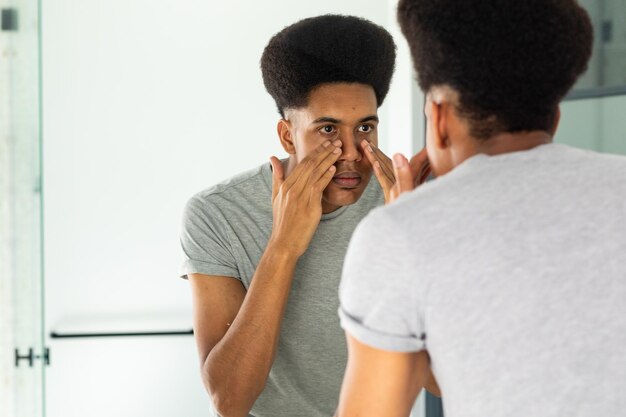Is Your Rosacea Making You Itch? Here's What You Need to Know
When it comes to skin conditions, rosacea is a bit of an enigma. Often characterized by redness and visible blood vessels on the face, those who are familiar with rosacea understand the frustration it can bring. But does rosacea itch? Let's dive deep into this question, unravel the connections, and provide a well-rounded view of what rosacea sufferers might experience, along with practical tips for dealing with it.
Understanding Rosacea: Beyond the Redness
What is Rosacea?
Rosacea is a chronic skin condition primarily affecting the face, marked by redness, visible blood vessels, and sometimes acne-like bumps. It often surfaces after the age of 30 and is more common in people with fair skin. The exact cause isn't well understood, but factors like genetics, environmental triggers, and an abnormal immune response may play a significant role.
Types of Rosacea
- Erythematotelangiectatic Rosacea (ETR): Known for redness, flushing, and visible blood vessels.
- Papulopustular Rosacea: Similar to acne, with redness and swelling alongside breakouts.
- Phymatous Rosacea: Thickening of the skin and a bumpy texture, sometimes affecting the nose.
- Ocular Rosacea: Affects the eyes, leading to irritation and redness.
Common Symptoms
- Persistent redness
- Flushing or blushing
- Visible blood vessels
- Swollen skin
- Acne-like breakouts
- Burning or stinging sensation
Does Rosacea Cause Itching?
The Itch Factor
It's not uncommon for individuals with rosacea to report itching as a symptom. While itching isn't the hallmark of rosacea, it can certainly occur. This sensation may arise from:
- Dryness: The compromised skin barrier due to rosacea might lead to dryness, which naturally results in itching.
- Inflammation: Rosacea is an inflammatory condition. The body’s inflammatory response might contribute to the itchiness.
- Secondary Dermatitis: Sometimes, rosacea can be complicated by another skin condition like seborrheic dermatitis, which is known for causing an itchy rash.
Itching as an Indirect Symptom
While identifiable itchiness might not be standardized across all who suffer from rosacea, various factors might amplify this sensation:
- Environmental Conditions: Cold, wind, and sun exposure may strip moisture from the skin, increasing irritation and itchiness.
- Cosmetic Products: Certain skincare and makeup products could irritate sensitive skin, leading to itchiness.
- Stress and Anxiety: Psychological factors can exacerbate skin sensitivity and potentially influence itchiness.
How to Manage Rosacea and Its Symptoms
Trigger Management
Identifying and avoiding triggers is a crucial step for anyone dealing with rosacea. Here are some common triggers:
- Sun exposure: Use broad-spectrum sunscreen daily.
- Hot or cold weather: Protect your skin with appropriate clothing and skincare.
- Stress: Consider mindfulness practices or stress-reduction techniques.
- Spicy foods and alcohol: Keep a food diary to identify and limit these triggers.
Skincare for Sensitive Skin
Adopting a gentle skincare routine can help mitigate symptoms, including itchiness. Consider these tips:
- Gentle Cleansing: Use a non-abrasive, alcohol-free cleanser.
- Moisturization: Opt for a fragrance-free, hypoallergenic moisturizer to combat dryness.
- Proper Product Selection: Look for skincare and makeup products labeled as suitable for sensitive skin.
Practical Self-Care Tips
- Cool Compresses: Apply a cool, damp cloth to the face to reduce itching and redness.
- Monitor Your Environment: Humidifiers can add moisture to dry indoor air.
- Patch Testing: Test new skincare products on a small area before using them on your face.
Medical Treatment Options
Consultation with Dermatologists
Visiting a dermatologist can help tailor treatments to individual needs. Some potential options may include:
- Topical Treatments: Creams or gels that can help to reduce redness and inflammation.
- Oral Medications: Antibiotics or other medications to address inflammation and lesions.
- Laser Therapy: Treatment for visible blood vessels and persistent redness.
Communicating Symptoms
Always communicate itching or any new symptoms to a healthcare professional, even if they seem mild. This helps develop a more comprehensive management plan tailored to your unique needs.
Distinguishing Rosacea from Other Conditions
Common Skin Conditions That Itch
Given that rosacea doesn't typically feature itching as a primary symptom, it’s crucial to differentiate it from other conditions that frequently cause itchiness:
- Eczema: Known for its itchy and inflamed patches.
- Contact Dermatitis: Reaction to certain substances causing redness and itching.
- Allergic Reactions: Often resulting in hives or widespread itchiness.
When to Seek a Diagnosis
If you experience persistent itching alongside redness and other rosacea-like symptoms, consider these steps:
- Document Symptoms: Keep a journal of symptoms, triggers, and skin responses.
- Consult a Professional: Medical advice can guide correct diagnosis and treatment.
- Prioritize Consistency: Maintain regular check-ups to adapt treatment as needed.
Empowerment Through Knowledge
By exploring the link between rosacea and itchiness, the hope is to provide clarity and practical guidance. While itching might not be the defining feature of rosacea, it's important to acknowledge that each individual's experience can differ. Equipping yourself with knowledge about your specific symptoms and how they relate to rosacea can make managing the condition much more actionable.
What's Next?
Using this knowledge, consider being proactive about:
- Tracking Personal Symptoms: Knowing your patterns helps with personalized care.
- Fostering Open Communication: Connect with healthcare providers for a collaborative approach to management.
- Exploring Support Networks: Sharing experiences with others facing similar challenges can be beneficial.
Efforts towards understanding your skin better can potentially lead to improved management of your condition, enhancing both your comfort and confidence.
Quick Summary for Rosacea & Itchiness:
- 🔍 Rosacea Primarily Causes Redness: Itching is possible and usually related to dryness and inflammation.
- **⚠️ Know Your Triggers: ** Sun, stress, spicy foods, and certain cosmetics might exacerbate symptoms.
- 🧴 Skincare is Key: Opt for gentle, non-irritating products specifically for sensitive skin.
- 👩⚕️ Consult a Dermatologist: Personalized treatments can offer substantial relief.
- 💬 Keep Communication Open: Regularly discuss symptoms like itchiness with healthcare providers to refine treatment plans.

